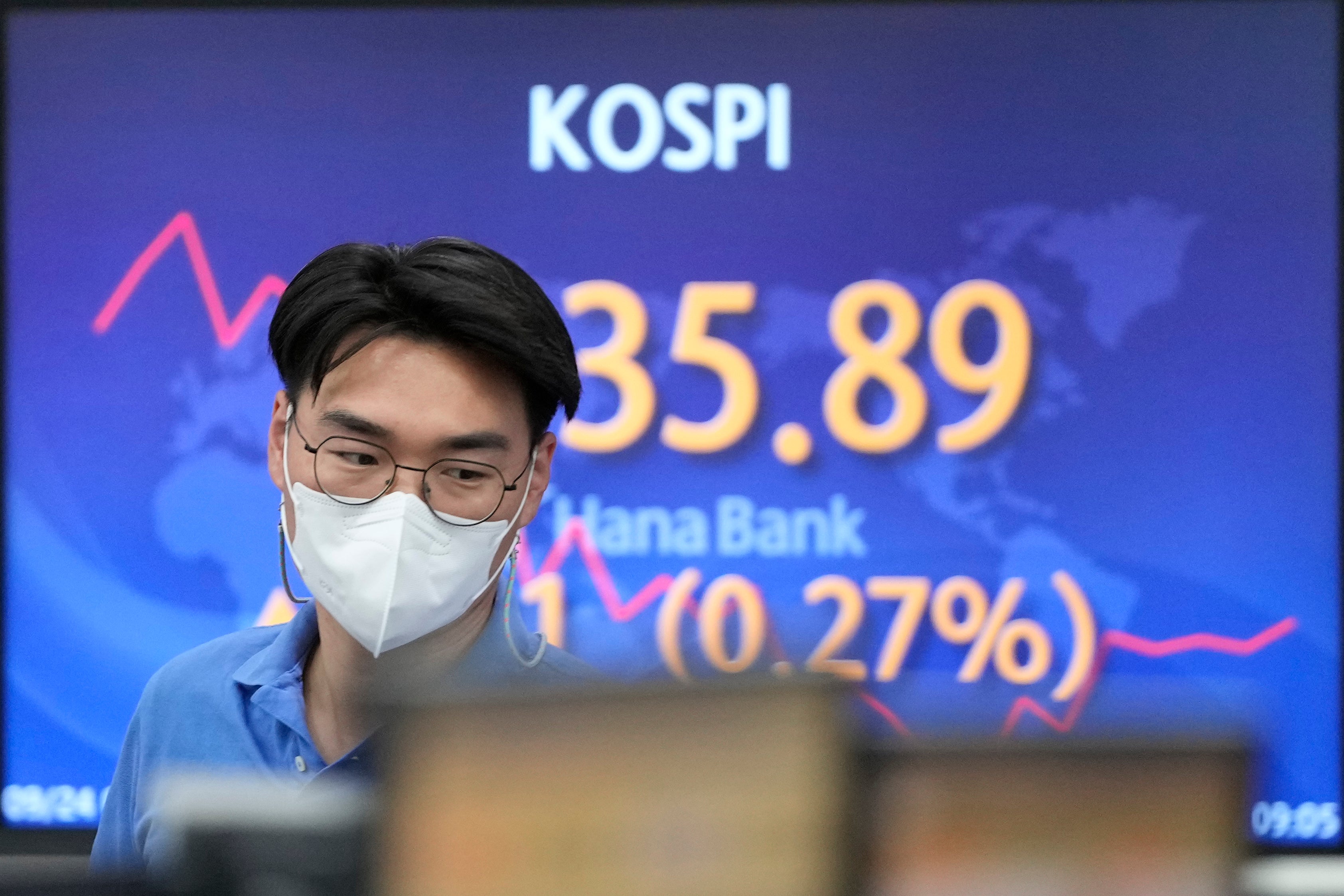Japan jumps, rest of Asia down, on China and virus concerns
Japan's benchmark gained but other Asian markets were lower amid concerns over troubled Chinese real estate developer Evergrande and the pandemic

Your support helps us to tell the story
From reproductive rights to climate change to Big Tech, The Independent is on the ground when the story is developing. Whether it's investigating the financials of Elon Musk's pro-Trump PAC or producing our latest documentary, 'The A Word', which shines a light on the American women fighting for reproductive rights, we know how important it is to parse out the facts from the messaging.
At such a critical moment in US history, we need reporters on the ground. Your donation allows us to keep sending journalists to speak to both sides of the story.
The Independent is trusted by Americans across the entire political spectrum. And unlike many other quality news outlets, we choose not to lock Americans out of our reporting and analysis with paywalls. We believe quality journalism should be available to everyone, paid for by those who can afford it.
Your support makes all the difference.Japan’s benchmark advanced but other Asian markets were lower Friday amid concerns over troubled Chinese real estate developer Evergrande and the pandemic.
Some Chinese banks have disclosed what they are owed by Evergrande, seeking to dispel fears of financial turmoil as it struggles under $310 billion in debt. The lenders say they can cope with a potential default. Evergrande’s announcement that it was making a payment due Thursday seemed to help ease some worries.
On Wall Street stocks rose broadly for a second day in a row, reversing losses for the week. Investors were pleased to have gotten some clarity from the Federal Reserve a day earlier that it was not on the verge of raising interest rates.
Japan s benchmark Nikkei 225 jumped 2.1% to finish at 30,248.81 after reopening from Thursday's national holiday. South Korea's Kospi edged down 0.1% to 3,125.02. Australia's S&P/ASX 200 slipped 0.4% to 7,342.60. Hong Kong's Hang Seng declined 0.2% to 24,463.66, while the Shanghai Composite lost nearly 0.6% to 3,622.10.
Masayuki Tsunashima of Mizuho Bank warned risks remained for markets from the potential troubles at Evergrande. Prolonged coronavirus outbreaks also pose risks, he said.
“So, it cannot be ruled out that optimism remains fragile or, at the very least opportunistic as underlying risks have simply not been addressed, much less put to bed,” he said. “And this is consistent with markets remaining prone to volatility and negative shocks.”
On Wall Street, stocks rose for the second straight day, reversing the sharp pullback at the start of the week. The S&P 500 rose 1.2% to 4,448.98. More than 85% of companies in the benchmark index notched gains.
The Dow gained 1.5% to 34,764.82, while the Nasdaq rose 1% to 15,052.24. The Russell 2000 rose 1.8% to 2,259.04. It’s up 1% for the week.
The rally put the major indexes on pace for weekly gains just four days after a broad sell-off on Monday handed the S&P 500 its biggest skid since May and knocked the Dow more than 600 points lower.
The market’s sharp swings reflect how quickly investor sentiment can change. With the market hovering near all-time highs, traders tend to see waves of selling as buying opportunities.
Traders had been feeling uneasy about how quickly the U.S. Federal Reserve might elect to rein in some of the support measures it’s been giving the markets and economy. Those worries were allayed by Wednesday, when the Federal Reserve signaled it wouldn’t begin considering such a tapering of support before at least November, and indicated it may start raising its benchmark interest rate sometime next year.
The Fed said it will likely begin slowing the pace of monthly bond purchases made throughout the pandemic to help keep borrowing costs low “soon” if the economy keeps improving.
In energy trading, benchmark U.S. crude oil rose 7 cents to $73.37 a barrel in electronic trading on the New York Mercantile Exchange. It gained $1.07 to $73.30 a barrel on Thursday.
Brent crude, the international standard, added 20 cents to $77.45 a barrel.
In currency trading, the U.S. dollar rose to 110.52 Japanese yen from 110.30 yen. The euro cost $1.1737, little changed from $1.1736.